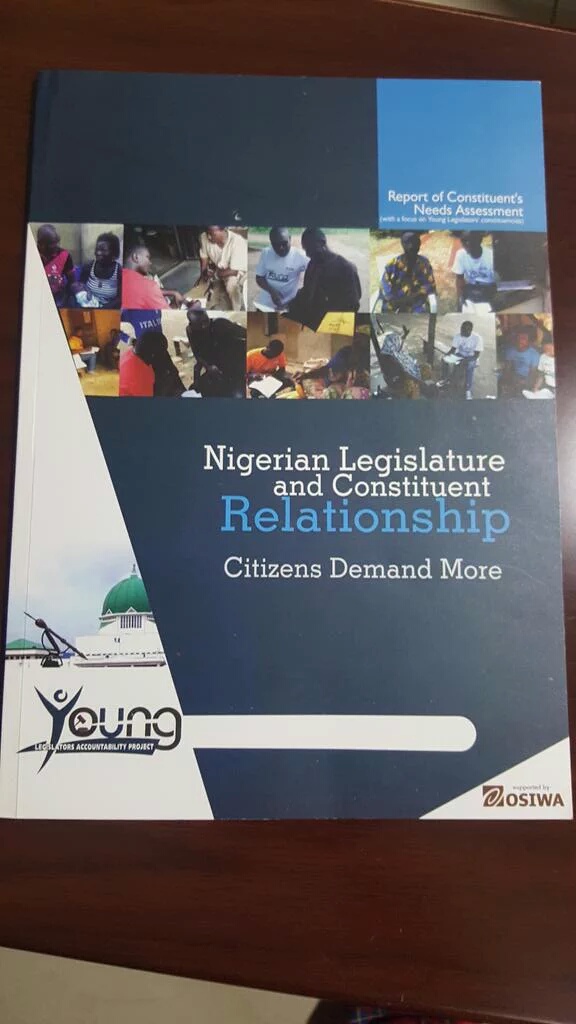As part of our efforts to deepen legislative accountability and citizens’ participation, YIAGA under its Young Legislators Accountability Project (YLAP) supported by the Open Society Initiative for West Africa (OSIWA) conducted a Constituents Needs Assessment to assemble empirical data on the expectations and needs of constituents vis-à-vis promises made by legislators during elections. The assessment further examines strategies for effective citizens engagement with elected representatives in the National Assembly. The study was anchored on a theory of change that improvements in social conditions of the constituencies with young legislators are only possible if legislative activities (including campaign promises) are targeted at actualising constituents’ needs (and also realistic expectations) and not legislators’ needs or selfish desires.
Findings
The study revealed that in a bid to secure electoral votes, legislators make promises not attainable within their constitutional mandate. Most campaign promises are framed in line with the dominant socio-economic challenges of a community without recourse to the constitutional powers of the legislature. Unemployment, education and provision of basic social amenities like roads, healthcare and electricity are the key priority needs of constituents in 90% of constituencies surveyed. Also, legislator – constituent relationship is threatened by the overwhelming demands for individual assistance by constituents. This assistance is mostly in the form of financial assistance for family events e.g. burials, marriages, children christening, school fees, house rents etc. There is an erroneous impression about constituency projects. Constituents believe that legislators directly receive certain amount of funds to implement constituency projects hence their increased demands for financial hand-out and community projects.
The findings from our survey show that most Nigerians are ignorant of the core mandate of the legislature to due poor political education. This situation has impacted on the excessive expectations of constituents from their legislators, who on their part have failed to devise appropriate and genuine ways of managing these expectations. The need to establish accessible constituency offices within constituencies has not been taken seriously. The study also shows that constituency town hall meeting is rated as the most effective means of communication between legislators and constituents because it creates a platform where legislators can brief the people on issues that concern them, and citizens can provide feedback. However, legislators rarely use this tool of engagement. There is a belief that the reluctance to hold constituency town hall meetings or run effective constituency offices is attributed to the fear that they could be used as structured platforms for galvanizing constituents for legislator’s recall.
Furthermore, the study reveals that social media and technology has been under utilised by legislators and constituents for legislative engagement despite its potentials to improve communication and information flow between legislators and constituents.
Recommendations
- There is an urgent need to increase citizens understanding on the functions and powers of the legislature. This can be achieved through sustained civic education by different stakeholders at local, state and national level;
- Effective and innovative communication channels between constituents (citizens) and the legislature should be developed and strengthened. These should include: town hall meetings, radio, phone calls, voice SMS, SMS, twitter, Facebook, websites, Skype or conference calls, courtesy/advocacy visits and operational constituency offices;
- Legislators should prioritize constituency engagements. The National Assembly should devise a mechanism for monitoring constituency engagements of legislators since resources are provided under the National Assembly budget for constituency engagement. The National Assembly committees on constituency outreach should be mandated to engage critical stakeholders like citizens groups, media and other community associations in the exercise of its mandate;
- Managing and addressing constituents’ expectations, priority needs and legislators’ promises are crucial for democratic consolidation and it requires a robust legislature-executive relationship. There is need to strengthen legislative oversight, monitoring and evaluation of constituency projects. This can be achieved in partnership with civil society and constituents.
- Constituents’ needs assessment should be conducted on a periodic basis to inform policy actions and representation by legislators. This assessment can be facilitated with an operational constituency office. In the same vein, constituents should develop scorecards for holding their elected representatives accountable. Civil society organizations should facilitate the process of developing these scorecards.
Methodological Approach
The report presents qualitative and quantitative analysis of data generated from the study on constituents’ needs assessment. The focus of this study is on young federal legislators (aged 40 years and under) in the House of Representatives and their constituents. The study population covers 17 states and 28 constituencies across the states. In each of the constituencies, a representative sample of women, men, people with disabilities and youth were randomly selected. The sources of data were from both primary and secondary sources. The former was collected through key informant interviews with selected leaders and members of key interest groups. This was supplemented by the administration of questionnaires. The latter was gathered through desk review of relevant and related literatures drawn from journals, official publications, Constituents Needs Assessment (CAN) project documents, and periodicals, among others. In analysing the data, content analysis and descriptive statistical analysis were employed respectively for the secondary and primary data.
Signed.
Samson Itodo
Head of Research, Policy & Advocacy
